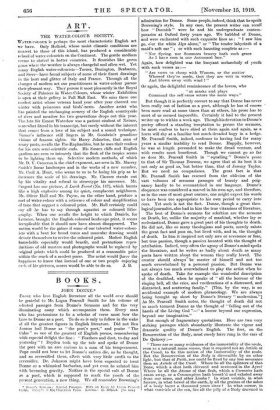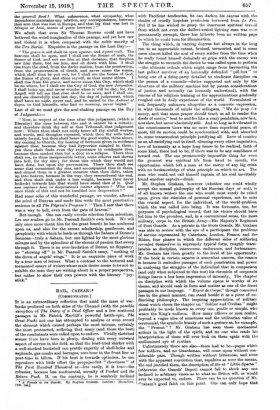BOOKS.
JOHN DONNE.*
_MOSE who love English literature all the world over should be grateful to Mr. Logan Pearsall Smith for his volume of selected passages from Donne's Sermons and for the very illuminating essay which accompanies them. Every man who has pretensions to be a scholar of verse must bow the knee to Donne as a poet. To do so is only to follow in the wake of all the greatest figures in English literature. Did not Ben Jonson hail Donne as " the poet's poet," and praise "The Calm" as one of the greatest of English poems, remembering with especial delight the line : Feathers and dust, to-day and yesterday " ? Dryden took up the tale and spoke of Donne the poet with an awe curious in a man of his temperament. Pope could not bear to let Donne's satires die, as he thought, and so reversified them, albeit with very little credit to the reversifier. Dr. Johnson might have been expected to treat Donne as a whimsical barbarian, and yet even he saluted him with becoming gravity. Neither is the special cult of Donne us a poet, which is supposed to mark the youth of the present generation, a new thing. We all remember Browning's • Donne's Rernmut: Selected Passages. With an Essay by Loan Pearsall Ernith. thefor.1: at the Clarendon rress. London: H. Milford. [Gs. net.] admiration for Donne. Some people, indeed, think that he spoilt Browning's style. In any case, the present writer can recall how " Donnish " were he and his undergraduate contem-
poraries at Oxford forty years ago. We babbled of Donne, and were enchanted with such exquisite lines as : "I saw him
go, o'er the white Alps alone," or "The tender labyrinth of a maid's soft ear " ; or with such haunting couplets as :— " Nor Spring. nor Summers beauty hath such grace As I have seen in one Autumnal face."
Again, how delighted was the buoyant melancholy of youth with such verses as
Are vows E0 cheap with Women, or the matter Whereof they're made, that they aro writ in water, And blown away with wind ? "
Or again, the delightful reminiscence of the lovers, who
"at masks and plays
Commend the self -same actors the same ways."
But though it is perfectly correct to say that Donne has never been really out of fashion as a poet, although he has of course
been more read at some times than at others, his prose has to most of us seemed impossible. Certainly it had to the present writer up to within a week ago. Though his devotion to Donne's poetry offered a standing temptation to peruse the sermons, he must confess to have shied at them again and again, as a horse will shy at a familiar but much-dreaded bogy in a hedge.
Mr. Pearsall Smith, indeed, confesses to having had for many years a similar inability to read Donne. Happily, however, he was at length persuaded to make the dread venture, and with results most beneficent. Though we cannot go so far as does Mr. Pearsall Smith in " equalling " Donne's prose to that of Sir Thomas Browne, we agree that at its best it is not only as good as, but better than, that of Jeremy Taylor. But we need no comparisons. The great fact is that Mr. Pearsall Smith has rescued from the oblivion of the vast volumes of sermons passages of beauty and poig- nancy hardly to be overmatched in our language. Donne's
eloquence was considered a marvel in his own age, and therefore, as in the case of most great orators, one might expect his words
to have been too appropriate to his own period to carry into ours. Yet such is not the fact. Donne, though a great theo- logical journalist, also had in him the true vitamine,s of literature.
The best of Donne's sermons for seleftion are the sermons on Death, for, unlike the majority of mankind, whether lay or ecclesiastical, Donne gave a great part of his thoughts to death. He did not, like so many theologians and poets, merely salute the great fact and pass on, but lived with, and in, the thought of death. In him it inspired not only awe or reverence or fear, but true passion, though a passion haunted with the thought of retribution. Indeed, very often the agony of Donne's mind spoils the literature, and he writes as badly about death as many poets have written about the woman they really loved. The
creator should always'. be master of himself and not too much overwhelmed by a personal passion. But Donne was
not always too much overwhelmed to play the artist when he spoke of death. Take for example the wonderful description of the deathbed, when he speaks of all the honour of the ringing bell, all the cries, and vociferations of a distressed, and distracted, and scattering family." [This, by the way, is no accidental example of modern phraseology. We are always being brought up short by Donne's literary "modernism."] As Mr. Pearsall Smith notes, the thought of death did not so much torment Donne as the thought of "falling out of the hands of the Living God "—" a horror beyond our expression, beyond our imagination."
But enough of fragmentary quotations. Here are two very striking passages which abundantly illustrate the vigour and dramatic quality of Donne's English. The first, on the Resurrection of the Body, must surely have rung in the ears of De Quincey :—
" There are so many evidences of the immortality of the soule, even to a naturall mans reason., that it required not an Article of the Creed, to fix this notion of the Immortality of the smile. But the Resurrection of the Body is discernible by no other light, but that of Faith, nor could be fixed by any less assurance then an Article of the Creed. Where be all the splinters of that Bone, which a shot hath shivered and scattered in the Ayres? Where be all the Atoms of that flesh, which a Corrosive hath eaten away, or a Consumption hath breatb'd and exhaled away from our arms, and other Limbs ? In what wrinkle, in what furrow, in what bowel of the earth, ly all the graines of the ashes of a body burnt a thousand years since ? In what corner, in what ventricle of the sea, lies all the jelly of a Body drowned in the general 'food ? What cohaerence, what sympathy, what dependence maintains any relation, any correspondence, between that arm that was lost in Europe, and that leg that was lost in Afrique or Asia, scores of yeers between ? "
We admit that even Sir Thomas Browne could not have bettered the weird imagination of this passage, and yet how raw and violent it is when compared with the noble suavity of the Urn Burial. Exquisite is the passage on the Last Day:— " The grave it self shall be open againe : and Aperti coeli. The heavens shall be open, and I shall see the Sonne of man, the Sonne of God, and not see him at that distance, that Stephen saw him there, but see him, and sit down with him. I shall rise from the dead, from the darke station, from the prostration, from the prostemation of death, and never mime the sunne, which shall then be put out, for I shall see the Bonne of God, the Swine of glory, and shine myself, as that sunne shines. I shall rise from the grave, and never misse this City, which shall be no where, for I shall see the City of God, the new Jerusalem. I shall looke up, and never wonder when it will be day, for, the Angell will tell me that time ehall be no more, and I shall see, and see cheerefully that last day, the day of judgement, which shall have no night, never end, and be united to the Antient of dayee, to God himself°, who had no morning, never began."
Last of all we must give the soul-shaking passage on the Day of Judgment :— " Now, in respect of the time after this judgement, (which is Eternity) the time between this and it cannot be a minute ; and therefore think thy self at that Tribunal', that judgement now : Where thou shalt not onely heare all thy sinfull workes, and words, and thoughts repeated, which thou thy selfe hadst utterly forgot, but thou shalt heare thy good works, thine almes, thy coming to Church, thy hearing of Sermons given in evidence against thee, because they had hypocrisie mingled in them ; yea thou shalt finde even thy repentance to condemne thee, because thou modest that but a door to a relapse. There thou shalt see, to thine inexpressible terror, some otheres cast downe into hell, for thy sins ; for those sins which they would not have done, but upon thy provocation. There thou shalt see some that occasioned thy sins, and accompanied thee in them, and sinned them in a greater measure than thou didst, taken up into heaven, because in the way, they remembered the end, and thou shalt sink under a less weight, because thou never lookedst towards him that would have eased thee of it. Quie non cogitano haec in deeperationis rotetur abyssum ? Who can once think of this and not be tumbled into desperation ? "
Had some echo of this wonderful. passage, we wonder, affected the mind of Bunyan and made him write the most penetrative sentence in all The Pilgrim's Progress? "Then I saw that there was a way to hell, even from the gate of heaven."
But enough. One can easily overdo selection from selections. Let our readers go to Mr. Pearsall Smith's own book. We will only once more thank him for the great benefit he has conferred upon us, and also for the serene scholarship, gentleness, and perspicuity with which he leads us through the Sahara of Donne's Sermons—truly a Sahara, but one lighted by the most glorious mirages and by the splendour of the storms of passion that sweep through it. There is no over-laudation of Donne, no flippancy, no "showing off" in Mr. Pearsall Smith's essay, "nothing of the down of angels' wings." It is an exquisite piece of work by a true man of letters. What a contrast to the tortured and tormented essays of writers whose main desire seems to be not to ,„ exhibit the man they are writing about in a proper perspective, but rather to show their own powers with the literary " joy-







































 Previous page
Previous page